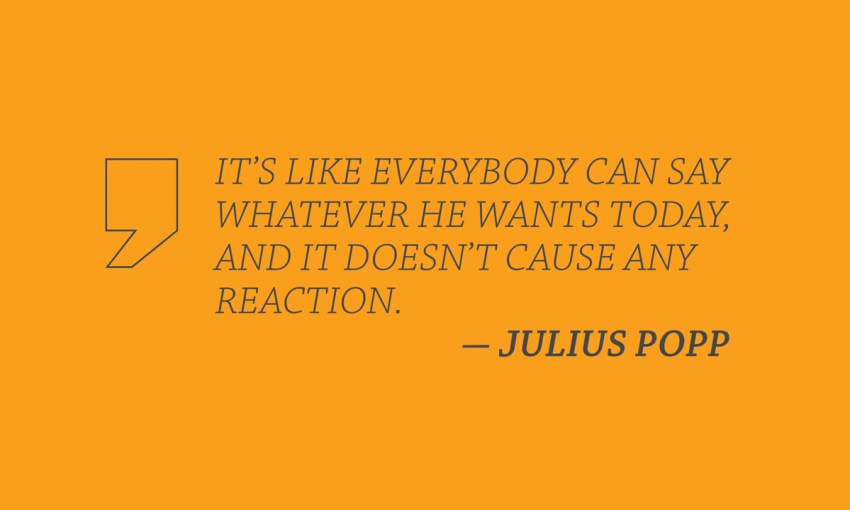CityMag publisher Josh Fanning won a prize and some deep insight on the same day.
We won
Yesterday, we won.
CityMag’s editor boarded a plane for Tokyo – the first stop on a three-city tour throughout east Asia to preview works OzAsia will bring to Adelaide in September and October.
Meanwhile, I landed at the headland of Berriedale Bay in Tasmania and walked up the 99 stairs to MONA.
You can join City Standard and influence the next stage of development of this exciting media platform for South Australia and the world by visiting the website and clicking “Sign up”.
Just the fact you’re travelling, that you’ve left your desk and the loop you run between home and work, makes you feel like a winner.
But on top of this feeling, and with neither Farrin nor I in attendance, the Walkley Foundation (Australian national foundation for the excellence of Journalism) announced at their Mid-Year Celebration that we had literally won something.
We launched the City Standard two months ago as a way for us to develop a new conversation with our audience and create a more sustainable and stable funding model for content creators – or as we call them: journalists, writers, illustrators, photographers, and filmmakers.
Alongside four other projects from among 160, the City Standard was selected by the Walkley Foundation to receive funding.
We don’t often go in for awards.
And funnily enough – we’ve never won anything either. However, this prize from the Walkley Foundation is more than money, it’s acknowledgement that our digital project is not only innovative but of a national and international standard.
Descending the steps into David Walsh’s collection at MONA you cannot help but be in awe of the vision and execution of his museum. It is singular and monumental, intimate and universal.
It is unlike anywhere I’ve ever been or will likely ever go to again – it’s actually that rare thing: unique.
MONA is an example of what the Internet, in its current state, will never provide to society, because it is not a synthesis of trends. I don’t think Mr Walsh got the idea for an underground bunker by looking at what Venice was doing or what the Louvre has done. He didn’t consult “the data” when considering whether anyone would come or not.
And yet people did come, in their droves.
Unlike MONA, the Internet is not built through instinct and passion – instead it is turning communication around, inside out and back-to-front. It’s led by the shallow metric of clicks and monetised through the advertising you see on our sites.
On B3 of MONA, against the backdrop of Triasic period sandstone, the work of Julius Popp, a German Artist living in New York, pours down water as words.
The words are stripped from the Internet, from what’s trending:
Pell
Trump
Sex
Citizenship
General
Into
Barnaby
Popp’s hypothesis is that human nature is being changed by the flow of information – for the worse. In particular, we are becoming apathetic ethical agents.
“Human brains have a specific speed, and once you go beyond that, they get lost. We are getting too much information, too quickly. How should we be able to emotionally process information that we get from Iran or Afghanistan or Pakistan or India? How should we deal with it? We have no means of taking action to change anything personally.
“I can go on the street and demonstrate, but nobody will listen. It’s like everybody can say whatever he wants today, and it doesn’t cause any reaction. I can write blogs on the internet, but nobody will hear me.”
They are Popp’s words, curated by Walsh and viewed by me – and they ring harshly true to my ears.
Online, in purely financial terms, each of you is worth just 2.5¢ to CityMag because that’s how much advertisers will pay per click.
Something is very wrong about that metric because it devalues your engagement and pushes us to flood you all with more and more information in which you might have a passing interest, while ignoring information in which a few people might have a deep interest.
And so we’re creating an alternative to the click bait system. The City Standard is a place where our audience can invest in stories that offer tangible insights into our shared reality.
That’s a wordy way of putting it, but what I mean is that when you sign up to City Standard you will be able to engage with writers, photographers, illustrators, and filmmakers in the creative process and then sit back and watch their work come to fruition.
Words can change you. Individuals can change the way we feel about the world.
The City Standard is only embryonic but so too is the Internet Age. I bet 1917 sounded futuristic to those living in it – 2017 is just the start of this whole new way of organising work, culture, and communication.
Let’s not settle for a wholesale, bulk-buy and discount approach.
I hope you’ll join us in setting a new standard.




